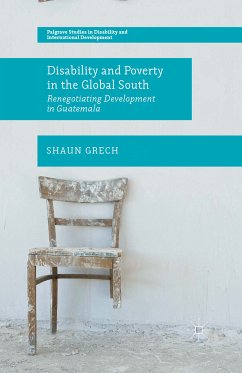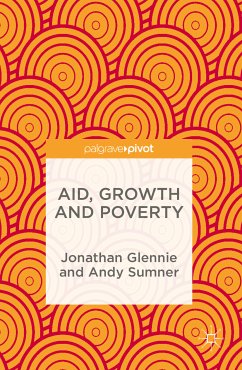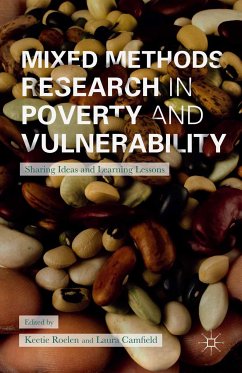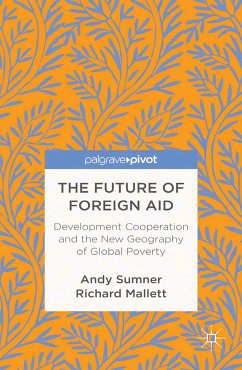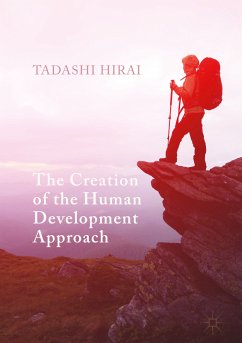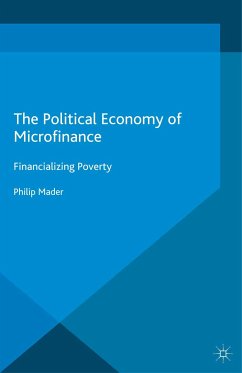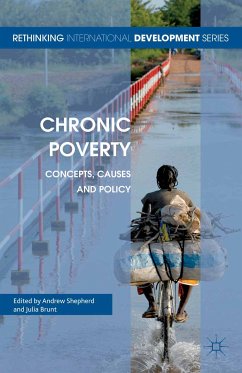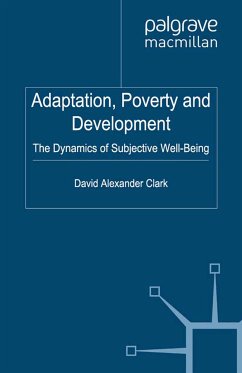
eBook, PDF
Adaptation, Poverty and Development (eBook, PDF)
The Dynamics of Subjective Well-Being
Redaktion: Clark, D.

PAYBACK Punkte
20 °P sammeln!






The first book to examine in detail the ways in which people adapt their understanding and behaviours towards poverty as a direct result to their experiences of poverty in developing countries, including world-leading academics and case studies from China, India, Ethiopia and South Africa.
Dieser Download kann aus rechtlichen Gründen nur mit Rechnungsadresse in A, B, BG, CY, CZ, D, DK, EW, E, FIN, F, GR, HR, H, IRL, I, LT, L, LR, M, NL, PL, P, R, S, SLO, SK ausgeliefert werden.
ABIGAIL BARR Associate Professor, School of Economics, University of Nottingham, UK MARCEL FAFCHAMPS Professor of Development Economics and Deputy Director of the Centre for the Study of African Economies, University of Oxford, UK RAMANI GUNATILAKA Department of Econometrics and Business Statistics, Monash University, Melbourne, Australia BEREKET KEBEDE Senior Lecturer in Economics, School of International Development, University of East Anglia, UK JOHN KNIGHT Professor of Economics, Department of Economics, University of Oxford, UK DANIEL NEFF Research Fellow, Institute of Asian Studies (IAS), German Institute of Global and Area Studies (GIGA), Hamburg, Germany WENDY OLSEN Senior Lecturer in Socio-Economic Research, Cathie Marsh Centre for Census and Survey Research (CCSR), and Institute for Development Policy and Management (IDPM), University of Manchester, UK MOZAFFAR QIZILBASH Professor of Politics, Economics and Philosophy in the Department of Economics and Related Studies and Director of the School of Politics, Economics and Philosophy, University of York, UK BHIM REDDY Ph.D student, Department of Anthropology, University of Hyderabad, India.
Produktdetails
- Verlag: Palgrave Macmillan UK
- Seitenzahl: 229
- Erscheinungstermin: 5. April 2012
- Englisch
- ISBN-13: 9781137002778
- Artikelnr.: 44922245
'Economics is venturing into a new world previously inhabited by psychologists, the extent to which people adapt in various ways to changing circumstances. Better knowledge of adaptation is fundamental to advancing our understanding of human behavior and feelings of well-being. This volume is a welcome and valuable contribution to an important and much-neglected subject.' Richard A. Easterlin, Professor of Economics, University of Southern California, USA
'This book breaks new ground by bringing together theoretical and empirical perspectives on the problem of adaptation, using case studies in India, China and Africa. Clear, insightful and methodical, it will become essential reading for all those interested in the increasingly
'This book breaks new ground by bringing together theoretical and empirical perspectives on the problem of adaptation, using case studies in India, China and Africa. Clear, insightful and methodical, it will become essential reading for all those interested in the increasingly
Mehr anzeigen
important question of how to interpret subjective measures of well-being, especially in a development context.' Tania Burchardt, Deputy Director, Centre for the Analysis of Social Exclusion, London School of Economics and Political Science, UK
'Is adaptation of deprived people to their often abysmal circumstances a healthy reaction which improves the quality of their lives? Or does it inhibit action to improve the situation by them and by others? This fascinating book explores such issues conceptually and empirically, and is especially pertinent today when 'happiness' is being promoted as the new metric of development.' - Frances Stewart, University of Oxford, UK
'...covers interesting themes that are of importance to those interested in the dynamics of subjective well-being (SWB), whether from a theoretical, empirical or policymaking perspective, which is a great achievement indeed...There is no doubt that anyone can learn a lot from reading this book. The range of topics covered is so broad that even experts in the field can enhance their knowledge as they also add new insights and open up novel perspectives for future research...the editor is certainly to be lauded for having succeeded in publishing a book thatmay also be read by non-specialists. For all these reasons, I expect Adaptation, Poverty and Development. The Dynamics of Subjective Well-Being to be well received by its readers.' - Claudia Tello, University of Barcelona, European Journal of Development Research
'Is adaptation of deprived people to their often abysmal circumstances a healthy reaction which improves the quality of their lives? Or does it inhibit action to improve the situation by them and by others? This fascinating book explores such issues conceptually and empirically, and is especially pertinent today when 'happiness' is being promoted as the new metric of development.' - Frances Stewart, University of Oxford, UK
'...covers interesting themes that are of importance to those interested in the dynamics of subjective well-being (SWB), whether from a theoretical, empirical or policymaking perspective, which is a great achievement indeed...There is no doubt that anyone can learn a lot from reading this book. The range of topics covered is so broad that even experts in the field can enhance their knowledge as they also add new insights and open up novel perspectives for future research...the editor is certainly to be lauded for having succeeded in publishing a book thatmay also be read by non-specialists. For all these reasons, I expect Adaptation, Poverty and Development. The Dynamics of Subjective Well-Being to be well received by its readers.' - Claudia Tello, University of Barcelona, European Journal of Development Research
Schließen
Für dieses Produkt wurde noch keine Bewertung abgegeben. Wir würden uns sehr freuen, wenn du die erste Bewertung schreibst!
Eine Bewertung schreiben
Eine Bewertung schreiben
Andere Kunden interessierten sich für


